The Cambridge History of Japan, Vol. 3: Medieval Japan
Подождите немного. Документ загружается.

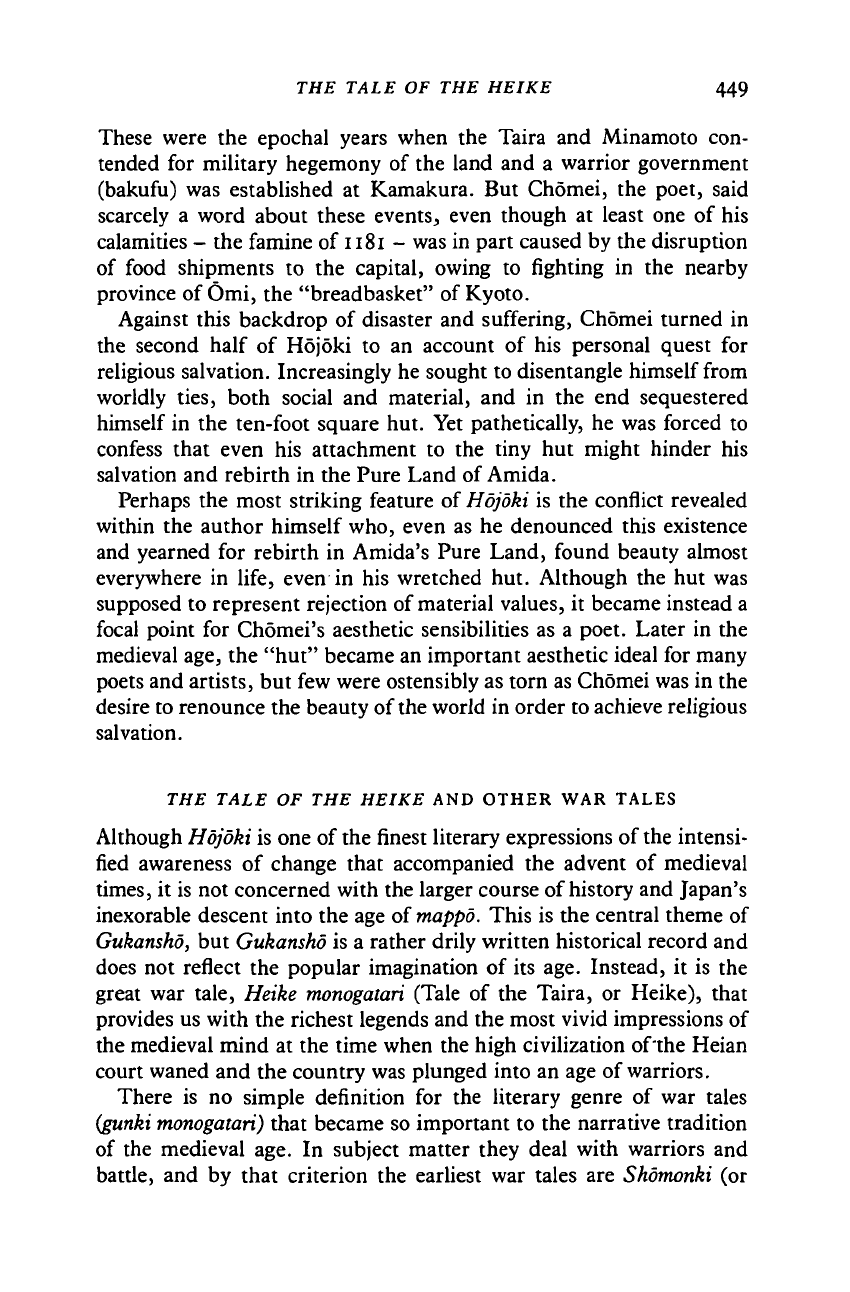
THE TALE OF THE HE IKE 449
These were the epochal years when the Taira and Minamoto con-
tended for military hegemony of the land and a warrior government
(bakufu) was established at Kamakura. But Chomei, the poet, said
scarcely a word about these events, even though at least one of his
calamities - the famine of 1181 - was in part caused by the disruption
of food shipments to the capital, owing to fighting in the nearby
province of Omi, the "breadbasket" of Kyoto.
Against this backdrop of disaster and suffering, Chomei turned in
the second half of Hojoki to an account of his personal quest for
religious salvation. Increasingly he sought to disentangle himself from
worldly ties, both social and material, and in the end sequestered
himself in the ten-foot square hut. Yet pathetically, he was forced to
confess that even his attachment to the tiny hut might hinder his
salvation and rebirth in the Pure Land of Amida.
Perhaps the most striking feature of Hojoki is the conflict revealed
within the author himself who, even as he denounced this existence
and yearned for rebirth in Amida's Pure Land, found beauty almost
everywhere in life, even in his wretched hut. Although the hut was
supposed to represent rejection of material values, it became instead a
focal point for Chomei's aesthetic sensibilities as a poet. Later in the
medieval age, the "hut" became an important aesthetic ideal for many
poets and artists, but few were ostensibly as torn as Chomei was in the
desire to renounce the beauty of the world in order to achieve religious
salvation.
THE TALE OF THE HEIKE AND OTHER WAR TALES
Although Hojoki is one of the finest literary expressions of the intensi-
fied awareness of change that accompanied the advent of medieval
times,
it is not concerned with the larger course of history and Japan's
inexorable descent into the age of mappo. This is the central theme of
Gukansho, but Gukansho is a rather drily written historical record and
does not reflect the popular imagination of its age. Instead, it is the
great war tale, Heike monogatari (Tale of the Taira, or Heike), that
provides us with the richest legends and the most vivid impressions of
the medieval mind at the time when the high civilization of the Heian
court waned and the country was plunged into an age of warriors.
There is no simple definition for the literary genre of war tales
(gunki monogatari) that became so important to the narrative tradition
of the medieval age. In subject matter they deal with warriors and
battle, and by that criterion the earliest war tales are Shomonki (or
Cambridge Histories Online © Cambridge University Press, 2008
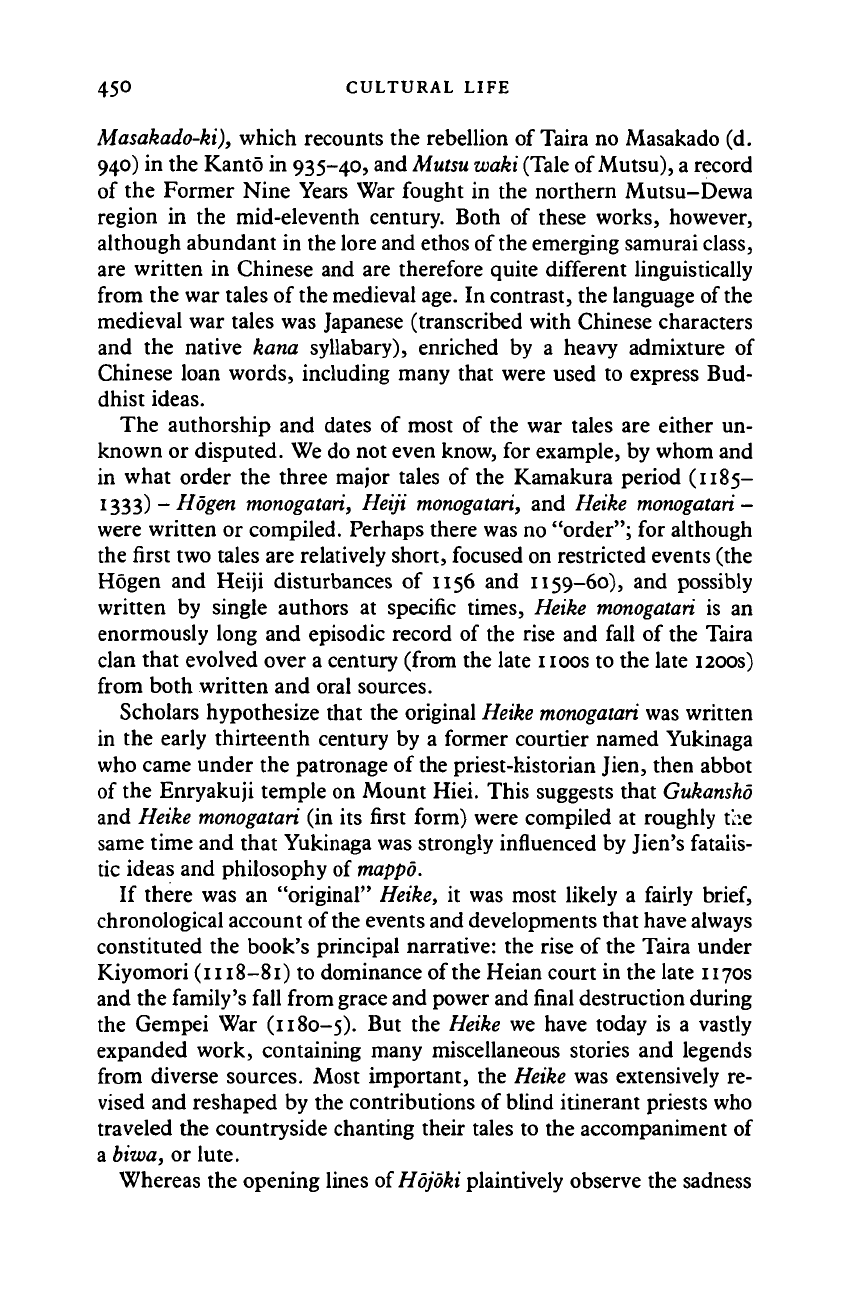
450 CULTURAL LIFE
Masakado-ki), which recounts the rebellion of Taira no Masakado (d.
940) in the Kanto in 935-40, and
Mutsu
waki (Tale of Mutsu), a record
of the Former Nine Years War fought in the northern Mutsu-Dewa
region in the mid-eleventh century. Both of these works, however,
although abundant in the lore and ethos of
the
emerging samurai class,
are written in Chinese and are therefore quite different linguistically
from the war tales of the medieval
age.
In contrast, the language of the
medieval war tales was Japanese (transcribed with Chinese characters
and the native kana syllabary), enriched by a heavy admixture of
Chinese loan words, including many that were used to express Bud-
dhist ideas.
The authorship and dates of most of the war tales are either un-
known or disputed. We do not even know, for example, by whom and
in what order the three major tales of the Kamakura period (1185-
I
333)
—
Hogen monogatari, Heiji monogatari, and Heike monogatari
—
were written or compiled. Perhaps there was no "order"; for although
the first two tales are relatively short, focused on restricted events (the
Hogen and Heiji disturbances of 1156 and 1159-60), and possibly
written by single authors at specific times, Heike
monogatari
is an
enormously long and episodic record of the rise and fall of the Taira
clan that evolved over a century (from the late 11 oos to the late 1200s)
from both written and oral sources.
Scholars hypothesize that the original
Heike monogatari
was written
in the early thirteenth century by a former courtier named Yukinaga
who came under the patronage of the priest-historian Jien, then abbot
of the Enryakuji temple on Mount Hiei. This suggests that
Gukansho
and Heike
monogatari
(in its first form) were compiled at roughly the
same time and that Yukinaga was strongly influenced by Jien's fatalis-
tic ideas and philosophy of
mappo.
If there was an "original" Heike, it was most likely a fairly
brief,
chronological account of the events and developments that have always
constituted the book's principal narrative: the rise of the Taira under
Kiyomori (1118-81) to dominance of
the
Heian court in the late 1170s
and the family's fall from grace and power and
final
destruction during
the Gempei War (1180-5). But the Heike we have today is a vastly
expanded work, containing many miscellaneous stories and legends
from diverse sources. Most important, the
Heike
was extensively re-
vised and reshaped by the contributions of blind itinerant priests who
traveled the countryside chanting their tales to the accompaniment of
a biwa, or lute.
Whereas the opening lines oiHojoki plaintively observe the sadness
Cambridge Histories Online © Cambridge University Press, 2008
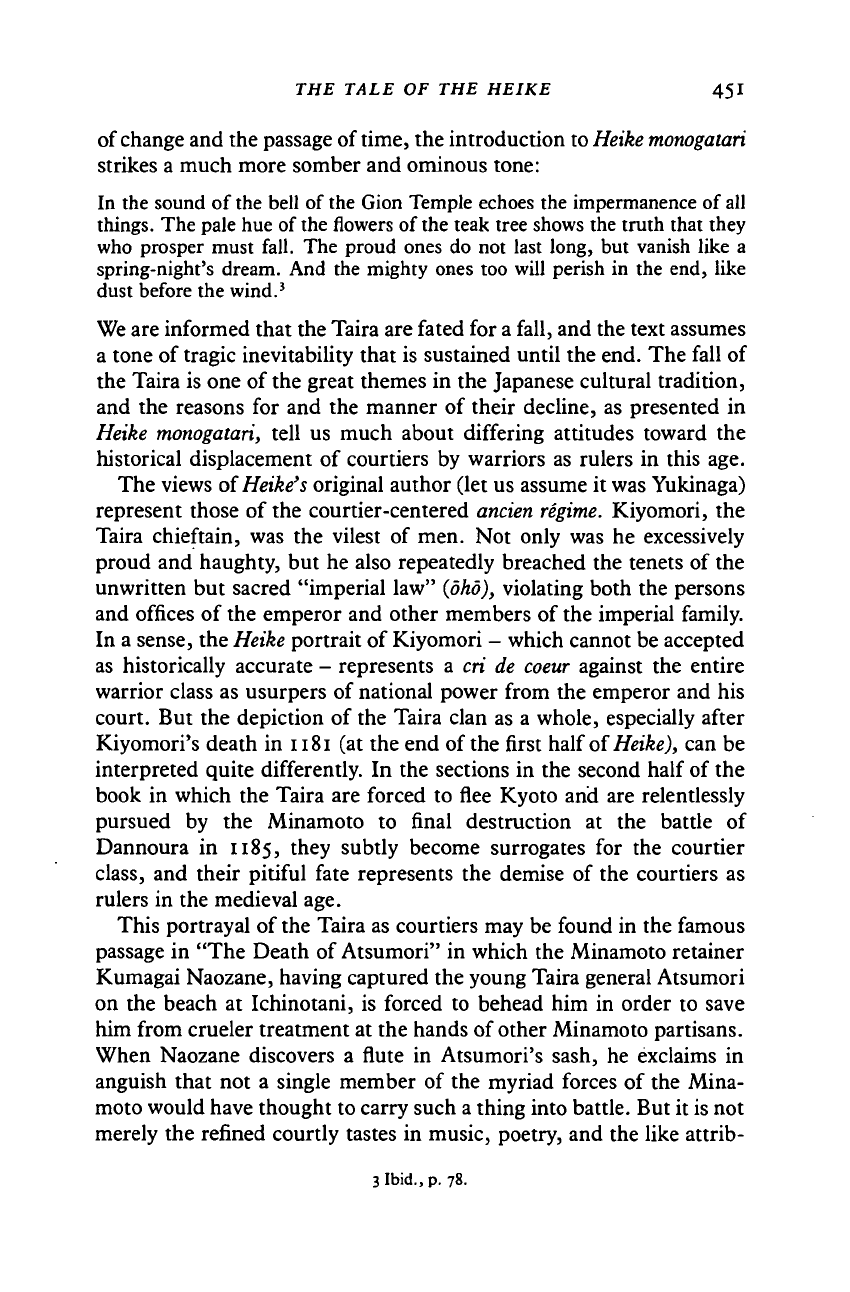
THE TALE OF THE HE IKE 451
of change and the passage of time, the introduction to Heike
monogatari
strikes a much more somber and ominous tone:
In the sound of the bell of the Gion Temple echoes the impermanence of all
things. The pale hue of the
flowers
of the teak tree shows the truth that they
who prosper must fall. The proud ones do not last long, but vanish like a
spring-night's dream. And the mighty ones too will perish in the end, like
dust before the wind.
3
We are informed that the Taira are fated for a fall, and the text assumes
a tone of tragic inevitability that is sustained until the end. The fall of
the Taira is one of the great themes in the Japanese cultural tradition,
and the reasons for and the manner of their decline, as presented in
Heike monogatari, tell us much about differing attitudes toward the
historical displacement of courtiers by warriors as rulers in this age.
The views of Heike's original author (let us assume it was Yukinaga)
represent those of the courtier-centered ancien
regime.
Kiyomori, the
Taira chieftain, was the vilest of men. Not only was he excessively
proud and haughty, but he also repeatedly breached the tenets of the
unwritten but sacred "imperial law" (oho), violating both the persons
and offices of the emperor and other members of the imperial family.
In a sense, the Heike portrait of Kiyomori - which cannot be accepted
as historically accurate - represents a cri de coeur against the entire
warrior class as usurpers of national power from the emperor and his
court. But the depiction of the Taira clan as a whole, especially after
Kiyomori's death in 1181 (at the end of the first half of Heike), can be
interpreted quite differently. In the sections in the second half of the
book in which the Taira are forced to flee Kyoto and are relentlessly
pursued by the Minamoto to final destruction at the battle of
Dannoura in 1185, they subtly become surrogates for the courtier
class,
and their pitiful fate represents the demise of the courtiers as
rulers in the medieval age.
This portrayal of the Taira as courtiers may be found in the famous
passage in "The Death of Atsumori" in which the Minamoto retainer
Kumagai Naozane, having captured the young Taira general Atsumori
on the beach at Ichinotani, is forced to behead him in order to save
him from cruder treatment at the hands of other Minamoto partisans.
When Naozane discovers a flute in Atsumori's sash, he exclaims in
anguish that not a single member of the myriad forces of the Mina-
moto would have thought to carry such a thing into battle. But it is not
merely the refined courtly tastes in music, poetry, and the like attrib-
3 ibid.,
P
. 78.
Cambridge Histories Online © Cambridge University Press, 2008
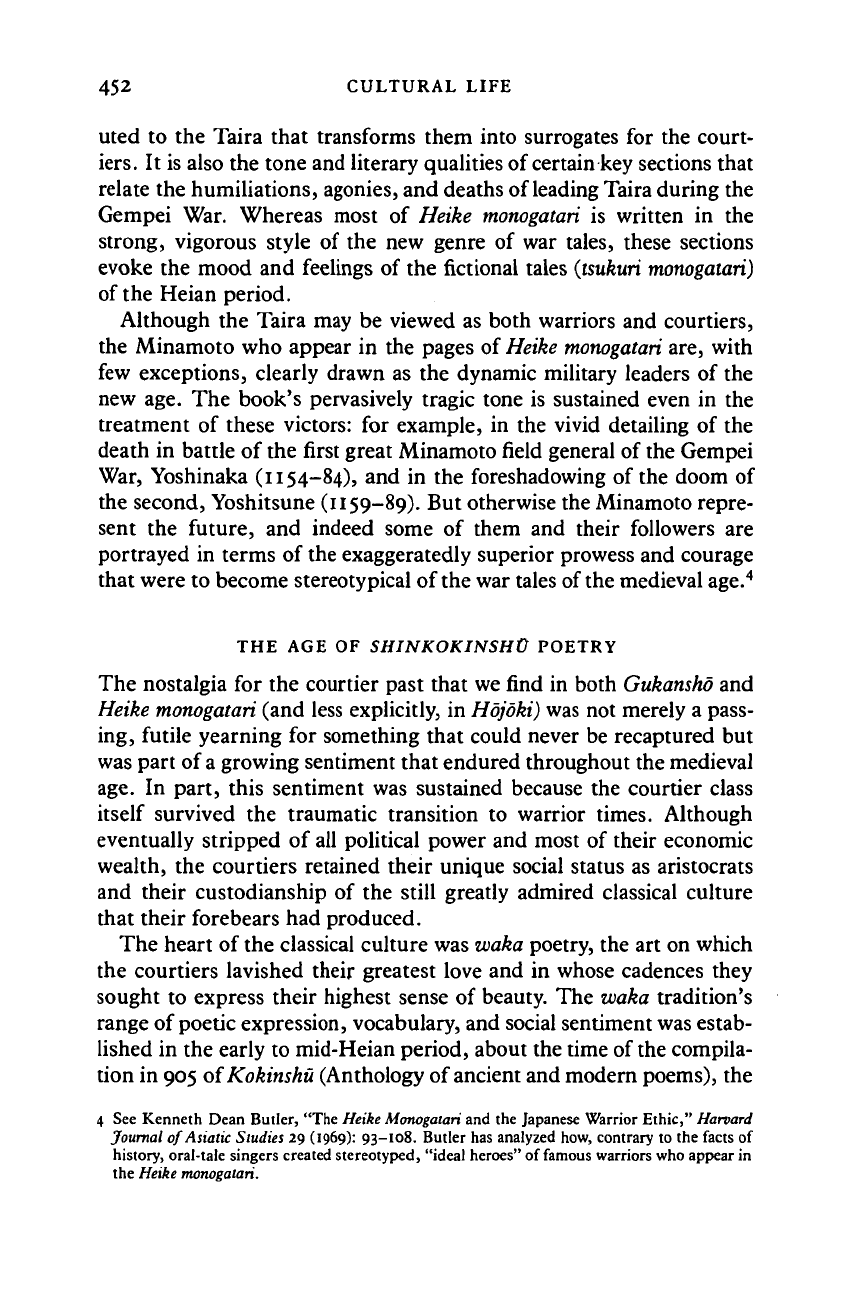
452 CULTURAL LIFE
uted to the Taira that transforms them into surrogates for the court-
iers.
It is also the tone and literary qualities of certain key sections that
relate the humiliations, agonies, and deaths of leading Taira during the
Gempei War. Whereas most of Heike
monogatari
is written in the
strong, vigorous style of the new genre of war tales, these sections
evoke the mood and feelings of the fictional tales
(tsukuri monogatari)
of the Heian period.
Although the Taira may be viewed as both warriors and courtiers,
the Minamoto who appear in the pages of
Heike monogatari
are, with
few exceptions, clearly drawn as the dynamic military leaders of the
new age. The book's pervasively tragic tone is sustained even in the
treatment of these victors: for example, in the vivid detailing of the
death in battle of the first great Minamoto field general of the Gempei
War, Yoshinaka (1154-84), and in the foreshadowing of the doom of
the second, Yoshitsune (1159-89). But otherwise the Minamoto repre-
sent the future, and indeed some of them and their followers are
portrayed in terms of the exaggeratedly superior prowess and courage
that were to become stereotypical of the war tales of
the
medieval age.
4
THE AGE OF SHINKOKINSHD POETRY
The nostalgia for the courtier past that we find in both
Gukansho
and
Heike monogatari
(and less explicitly, in
Hojoki)
was not merely a pass-
ing, futile yearning for something that could never be recaptured but
was part of a growing sentiment that endured throughout the medieval
age.
In part, this sentiment was sustained because the courtier class
itself survived the traumatic transition to warrior times. Although
eventually stripped of all political power and most of their economic
wealth, the courtiers retained their unique social status as aristocrats
and their custodianship of the still greatly admired classical culture
that their forebears had produced.
The heart of the classical culture was waka poetry, the art on which
the courtiers lavished their greatest love and in whose cadences they
sought to express their highest sense of beauty. The waka tradition's
range of poetic expression, vocabulary, and social sentiment was estab-
lished in the early to mid-Heian period, about the time of
the
compila-
tion in 905 of
Kokinshu
(Anthology of ancient and modern poems), the
4 See Kenneth Dean Butler, "The Heike Monogatari and the Japanese Warrior Ethic," Harvard
Journal of Asiatic Studies 29 (1969): 93-108. Butler has analyzed how, contrary to the facts of
history, oral-tale singers created stereotyped, "ideal heroes" of famous warriors who appear in
the Heike monogatari.
Cambridge Histories Online © Cambridge University Press, 2008
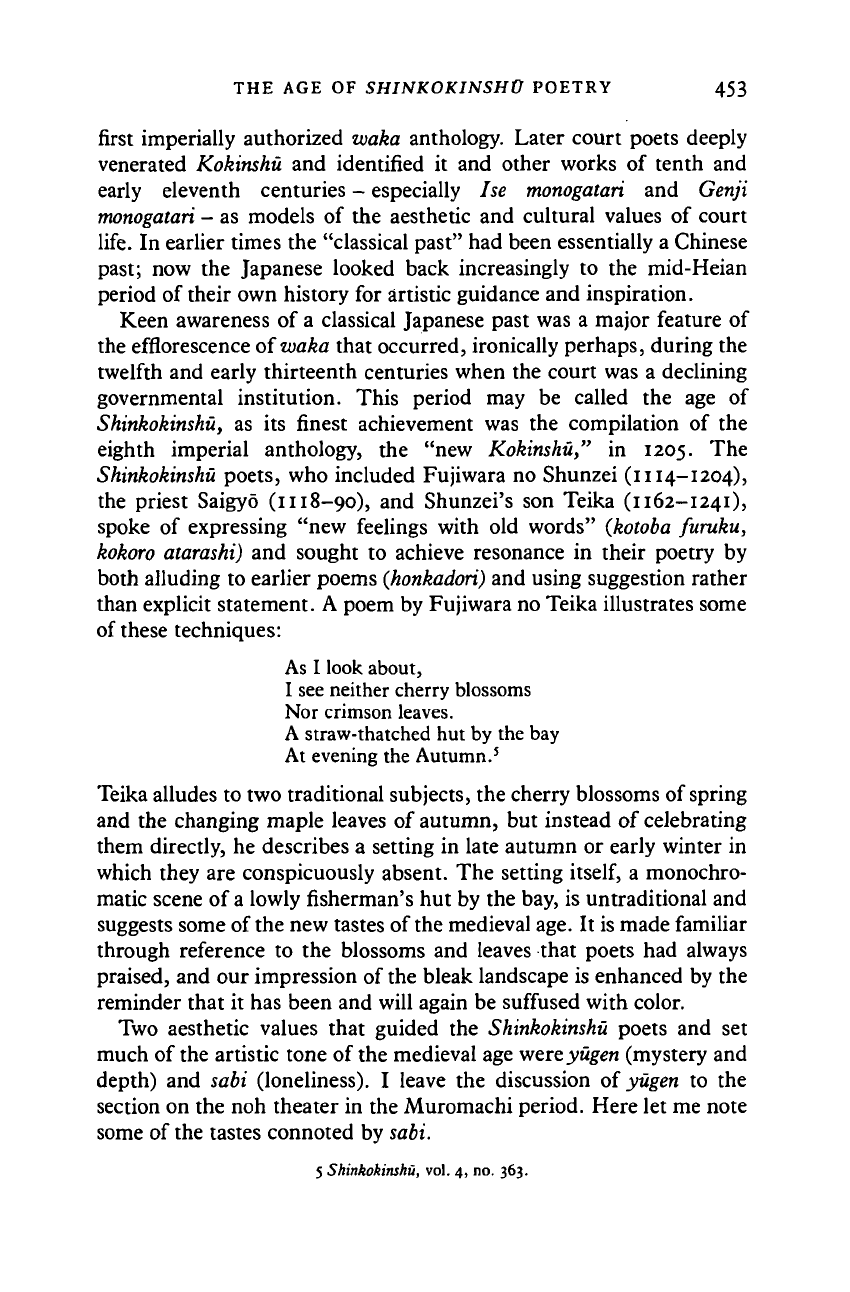
THE AGE OF SHINKOKINSHO POETRY 453
first imperially authorized waka anthology. Later court poets deeply
venerated Kokinshu and identified it and other works of tenth and
early eleventh centuries - especially he monogatari and Genji
monogatari
- as models of the aesthetic and cultural values of court
life.
In earlier times the "classical past" had been essentially a Chinese
past; now the Japanese looked back increasingly to the mid-Heian
period of their own history for artistic guidance and inspiration.
Keen awareness of a classical Japanese past was a major feature of
the efflorescence of waka that occurred, ironically perhaps, during the
twelfth and early thirteenth centuries when the court was a declining
governmental institution. This period may be called the age of
Shinkokinshu, as its finest achievement was the compilation of the
eighth imperial anthology, the "new Kokinshu," in 1205. The
Shinkokinshu poets, who included Fujiwara no Shunzei (n 14-1204),
the priest Saigyd (1118-90), and Shunzei's son Teika (1162-1241),
spoke of expressing "new feelings with old words" (kotoba furuku,
kokoro atarashi) and sought to achieve resonance in their poetry by
both alluding to earlier poems (honkadori) and using suggestion rather
than explicit statement. A poem by Fujiwara no Teika illustrates some
of these techniques:
As I look about,
I see neither cherry blossoms
Nor crimson leaves.
A straw-thatched hut by the bay
At evening the Autumn.
5
Teika alludes to two traditional subjects, the cherry blossoms of spring
and the changing maple leaves of autumn, but instead of celebrating
them directly, he describes a setting in late autumn or early winter in
which they are conspicuously absent. The setting
itself,
a monochro-
matic scene of a lowly fisherman's hut by the bay, is untraditional and
suggests some of the new tastes of the medieval age. It is made familiar
through reference to the blossoms and leaves that poets had always
praised, and our impression of the bleak landscape is enhanced by the
reminder that it has been and will again be suffused with color.
Two aesthetic values that guided the Shinkokinshu poets and set
much of the artistic tone of the medieval age were yugen (mystery and
depth) and sabi (loneliness). I leave the discussion of yugen to the
section on the noh theater in the Muromachi period. Here let me note
some of the tastes connoted by sabi.
5 Shinkokinshu, vol. 4, no. 363.
Cambridge Histories Online © Cambridge University Press, 2008
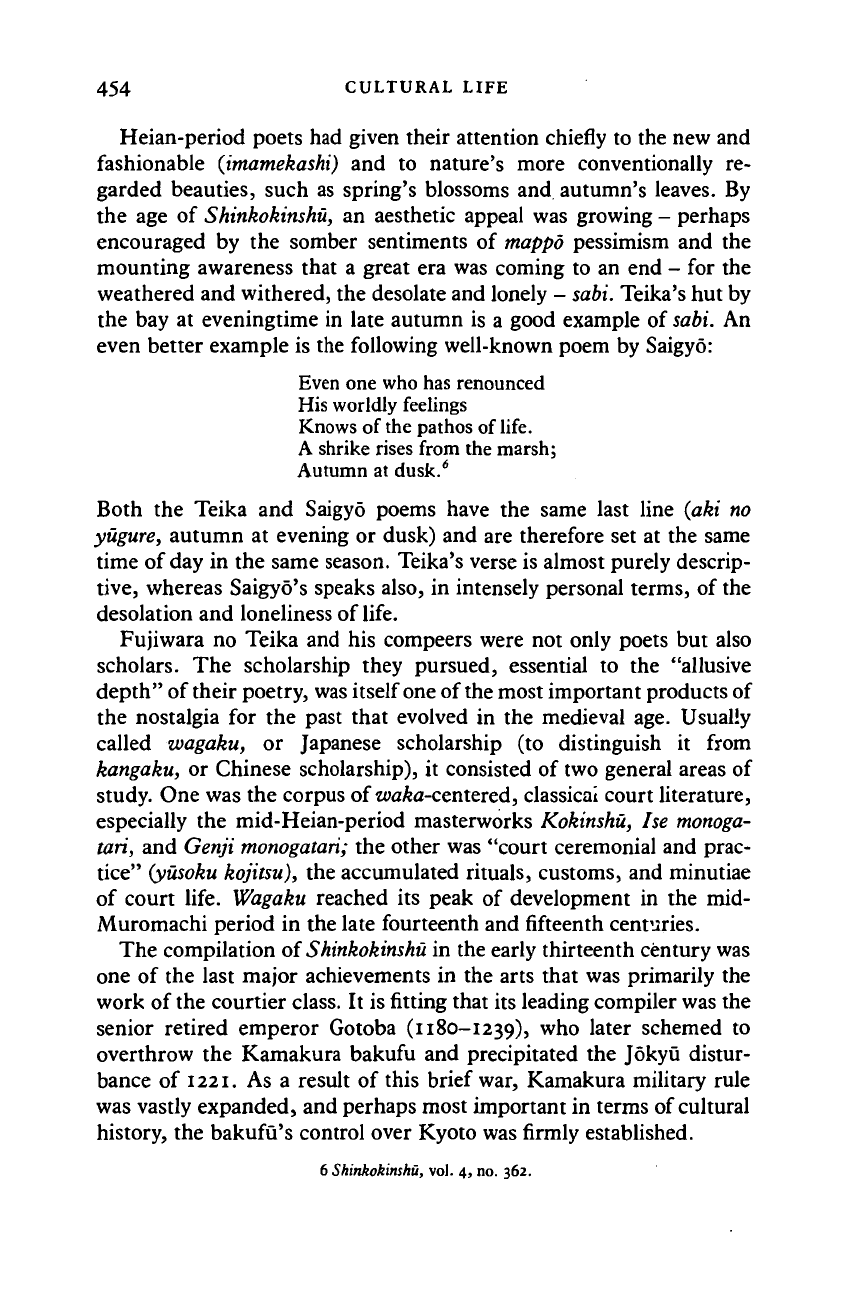
454 CULTURAL LIFE
Heian-period poets had given their attention chiefly to the new and
fashionable (imamekashi) and to nature's more conventionally re-
garded beauties, such as spring's blossoms and autumn's leaves. By
the age of Shinkokinshu, an aesthetic appeal was growing - perhaps
encouraged by the somber sentiments of mappo pessimism and the
mounting awareness that a great era was coming to an end - for the
weathered and withered, the desolate and lonely - sabi. Teika's hut by
the bay at eveningtime in late autumn is a good example of sabi. An
even better example is the following well-known poem by Saigyo:
Even one who has renounced
His worldly feelings
Knows of the pathos of life.
A shrike rises from the marsh;
Autumn at dusk.
6
Both the Teika and Saigyo poems have the same last line (aki no
yugure, autumn at evening or dusk) and are therefore set at the same
time of day in the same season. Teika's verse is almost purely descrip-
tive,
whereas Saigyo's speaks also, in intensely personal terms, of the
desolation and loneliness of life.
Fujiwara no Teika and his compeers were not only poets but also
scholars. The scholarship they pursued, essential to the "allusive
depth" of their poetry, was itself one of the most important products of
the nostalgia for the past that evolved in the medieval age. Usually
called wagaku, or Japanese scholarship (to distinguish it from
kangaku, or Chinese scholarship), it consisted of two general areas of
study. One was the corpus of «>a&a-centered, classical court literature,
especially the mid-Heian-period masterworks Kokinshu, he monoga-
tari, and Genji monogatari; the other was "court ceremonial and prac-
tice"
(yusoku kojitsu), the accumulated rituals, customs, and minutiae
of court life. Wagaku reached its peak of development in the mid-
Muromachi period in the late fourteenth and fifteenth centuries.
The compilation of Shinkokinshu in the early thirteenth century was
one of the last major achievements in the arts that was primarily the
work of the courtier class. It is fitting that its leading compiler was the
senior retired emperor Gotoba (1180-1239), who later schemed to
overthrow the Kamakura bakufu and precipitated the Jokyu distur-
bance of 1221. As a result of this brief war, Kamakura military rule
was vastly expanded, and perhaps most important in terms of cultural
history, the bakufu's control over Kyoto was firmly established.
6 Shinkokinshu, vol. 4, no. 362.
Cambridge Histories Online © Cambridge University Press, 2008
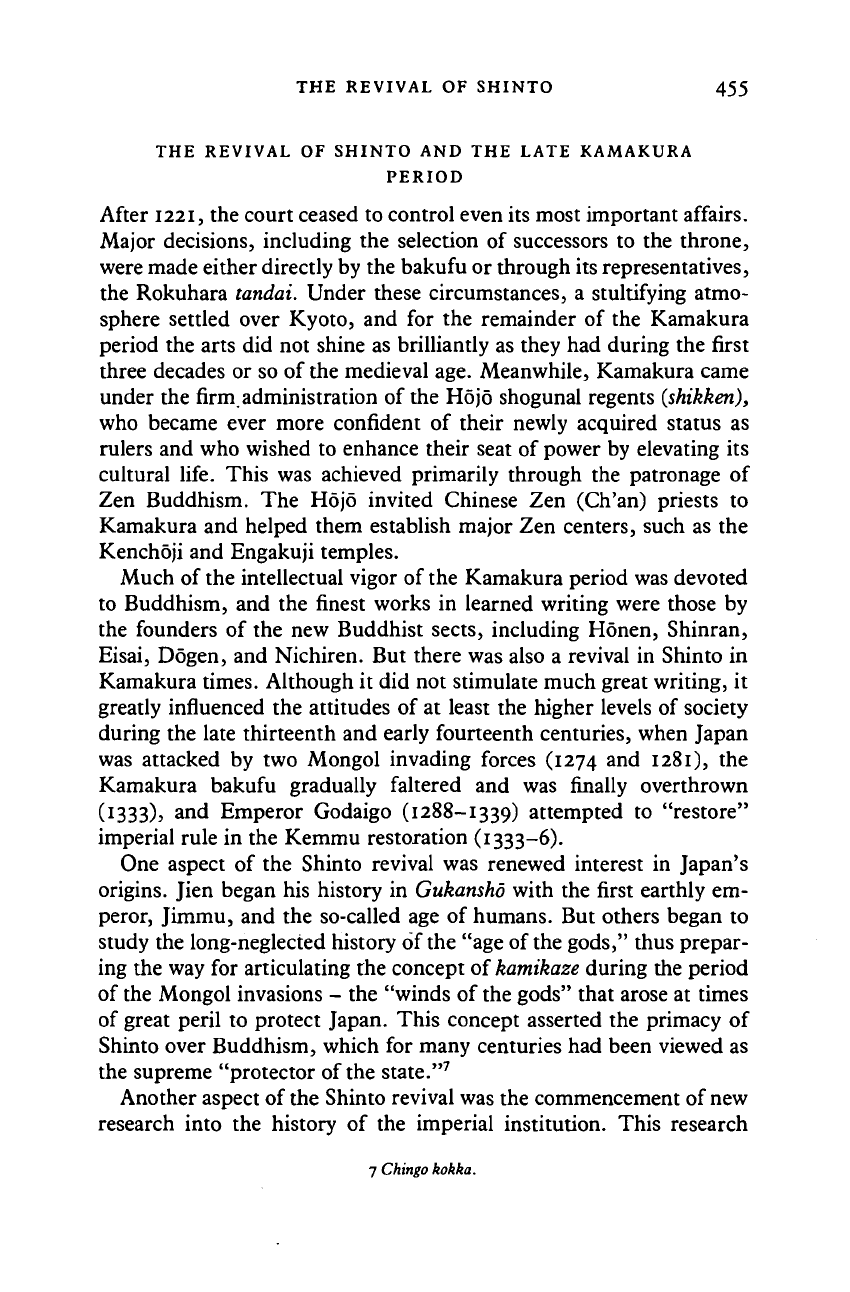
THE REVIVAL OF SHINTO 455
THE REVIVAL OF SHINTO AND THE LATE KAMAKURA
PERIOD
After
1221,
the court ceased to control even its most important affairs.
Major decisions, including the selection of successors to the throne,
were made either directly by the bakufu or through its representatives,
the Rokuhara
tandai.
Under these circumstances, a stultifying atmo-
sphere settled over Kyoto, and for the remainder of the Kamakura
period the arts did not shine as brilliantly as they had during the first
three decades or so of the medieval age. Meanwhile, Kamakura came
under the firm administration of the Hojo shogunal regents
(shikken),
who became ever more confident of their newly acquired status as
rulers and who wished to enhance their seat of power by elevating its
cultural life. This was achieved primarily through the patronage of
Zen Buddhism. The Hojo invited Chinese Zen (Ch'an) priests to
Kamakura and helped them establish major Zen centers, such as the
Kenchoji and Engakuji temples.
Much of the intellectual vigor of the Kamakura period was devoted
to Buddhism, and the finest works in learned writing were those by
the founders of the new Buddhist sects, including Honen, Shinran,
Eisai, Dogen, and Nichiren. But there was also a revival in Shinto in
Kamakura times. Although it did not stimulate much great writing, it
greatly influenced the attitudes of at least the higher levels of society
during the late thirteenth and early fourteenth centuries, when Japan
was attacked by two Mongol invading forces (1274 and 1281), the
Kamakura bakufu gradually faltered and was finally overthrown
(!333)J and Emperor Godaigo (1288-1339) attempted to "restore"
imperial rule in the Kemmu restoration (1333-6).
One aspect of the Shinto revival was renewed interest in Japan's
origins. Jien began his history in
Gukansho
with the first earthly em-
peror, Jimmu, and the so-called age of humans. But others began to
study the long-neglected history of the "age of
the
gods," thus prepar-
ing the way for articulating the concept of
kamikaze
during the period
of the Mongol invasions - the "winds of the gods" that arose at times
of great peril to protect Japan. This concept asserted the primacy of
Shinto over Buddhism, which for many centuries had been viewed as
the supreme "protector of the state."
7
Another aspect of the Shinto revival was the commencement of new
research into the history of the imperial institution. This research
7 Chingo kokka.
Cambridge Histories Online © Cambridge University Press, 2008
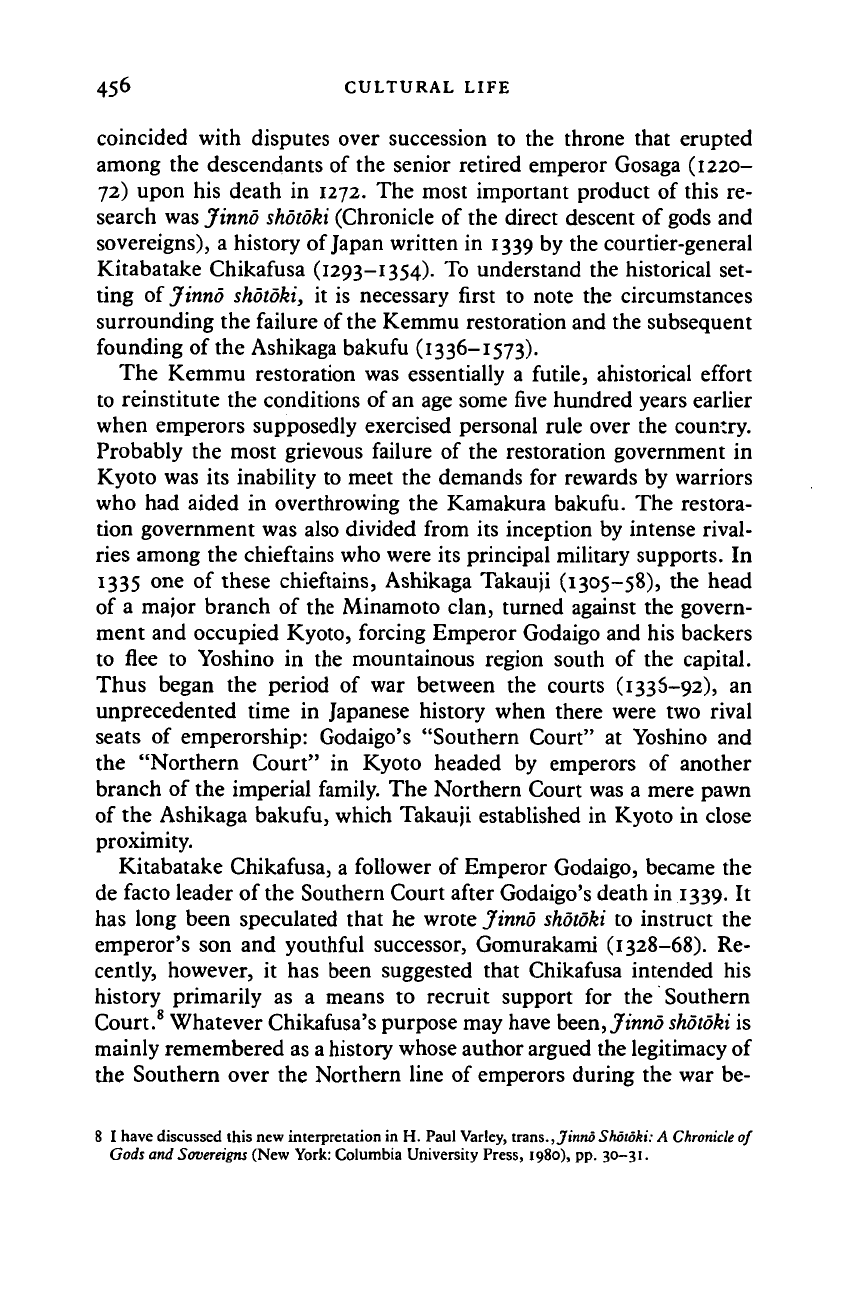
456 CULTURAL LIFE
coincided with disputes over succession to the throne that erupted
among the descendants of the senior retired emperor Gosaga (1220-
72) upon his death in 1272. The most important product of this re-
search was Jinno
shotoki
(Chronicle of the direct descent of gods and
sovereigns), a history of Japan written in 1339 by the courtier-general
Kitabatake Chikafusa (1293-1354). To understand the historical set-
ting of Jinno shotoki, it is necessary first to note the circumstances
surrounding the failure of the Kemmu restoration and the subsequent
founding of the Ashikaga bakufu (1336-1573).
The Kemmu restoration was essentially a futile, ahistorical effort
to reinstitute the conditions of an age some five hundred years earlier
when emperors supposedly exercised personal rule over the country.
Probably the most grievous failure of the restoration government in
Kyoto was its inability to meet the demands for rewards by warriors
who had aided in overthrowing the Kamakura bakufu. The restora-
tion government was also divided from its inception by intense rival-
ries among the chieftains who were its principal military supports. In
1335 one of these chieftains, Ashikaga Takauji (1305-58), the head
of a major branch of the Minamoto clan, turned against the govern-
ment and occupied Kyoto, forcing Emperor Godaigo and his backers
to flee to Yoshino in the mountainous region south of the capital.
Thus began the period of war between the courts (133S-92), an
unprecedented time in Japanese history when there were two rival
seats of emperorship: Godaigo's "Southern Court" at Yoshino and
the "Northern Court" in Kyoto headed by emperors of another
branch of the imperial family. The Northern Court was a mere pawn
of the Ashikaga bakufu, which Takauji established in Kyoto in close
proximity.
Kitabatake Chikafusa, a follower of Emperor Godaigo, became the
de facto leader of the Southern Court after Godaigo's death in 1339. It
has long been speculated that he wrote Jinno
shotoki
to instruct the
emperor's son and youthful successor, Gomurakami (1328-68). Re-
cently, however, it has been suggested that Chikafusa intended his
history primarily as a means to recruit support for the Southern
Court.
8
Whatever Chikafusa's purpose may have been, Jinno
shotoki
is
mainly remembered as
a
history whose author argued the legitimacy of
the Southern over the Northern line of emperors during the war be-
8 I have discussed this new interpretation in H. Paul Varley,
trans.,
Jinno
Shotoki:
A
Chronicle
of
Gods and
Sovereigns
(New York: Columbia University Press, 1980), pp.
30-31.
Cambridge Histories Online © Cambridge University Press, 2008
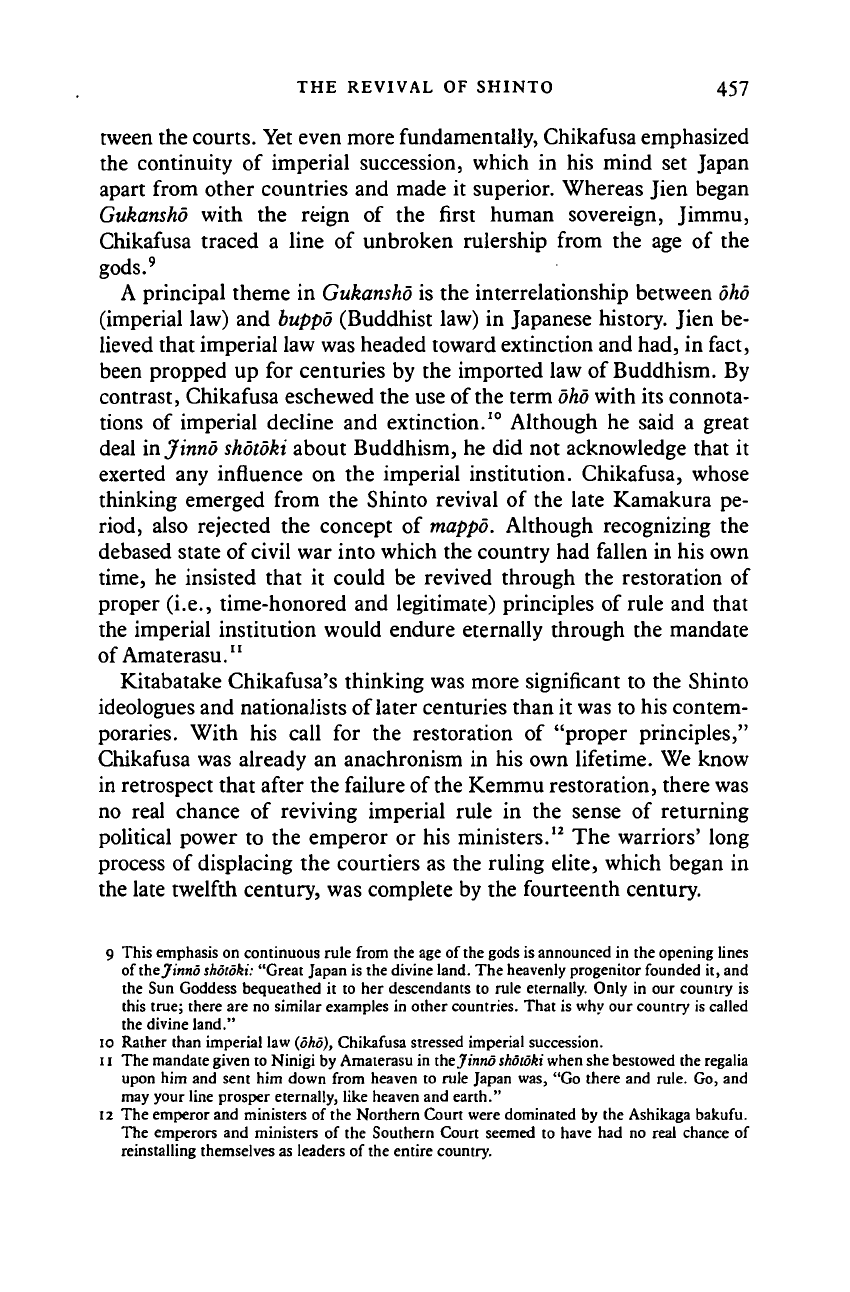
THE REVIVAL OF SHINTO 457
tween the courts. Yet even more fundamentally, Chikafusa emphasized
the continuity of imperial succession, which in his mind set Japan
apart from other countries and made it superior. Whereas Jien began
Gukansho with the reign of the first human sovereign, Jimmu,
Chikafusa traced a line of unbroken rulership from the age of the
gods.
9
A principal theme in Gukansho is the interrelationship between oho
(imperial law) and buppo (Buddhist law) in Japanese history. Jien be-
lieved that imperial law was headed toward extinction and had, in fact,
been propped up for centuries by the imported law of Buddhism. By
contrast, Chikafusa eschewed the use of the term
oho
with its connota-
tions of imperial decline and extinction.
10
Although he said a great
deal in Jinno shotoki about Buddhism, he did not acknowledge that it
exerted any influence on the imperial institution. Chikafusa, whose
thinking emerged from the Shinto revival of the late Kamakura pe-
riod, also rejected the concept of mappo. Although recognizing the
debased state of civil war into which the country had fallen in his own
time,
he insisted that it could be revived through the restoration of
proper (i.e., time-honored and legitimate) principles of rule and that
the imperial institution would endure eternally through the mandate
of Amaterasu.
11
Kitabatake Chikafusa's thinking was more significant to the Shinto
ideologues and nationalists of later centuries than it was to his contem-
poraries. With his call for the restoration of "proper principles,"
Chikafusa was already an anachronism in his own lifetime. We know
in retrospect that after the failure of the Kemmu restoration, there was
no real chance of reviving imperial rule in the sense of returning
political power to the emperor or his ministers.
12
The warriors' long
process of displacing the courtiers as the ruling elite, which began in
the late twelfth century, was complete by the fourteenth century.
9 This emphasis on continuous rule from the age of the gods is announced in the opening lines
of the Jinno
shotoki:
"Great Japan is the divine land. The heavenly progenitor founded it, and
the Sun Goddess bequeathed it to her descendants to rule eternally. Only in our country is
this true; there are no similar examples in other countries. That is why our country is called
the divine land."
10 Rather than imperial law (oho), Chikafusa stressed imperial succession.
11 The mandate given to Ninigi by Amaterasu in the Jinno
shotoki
when she bestowed the regalia
upon him and sent him down from heaven to rule Japan was, "Go there and rule. Go, and
may your line prosper eternally, like heaven and earth."
12 The emperor and ministers of the Northern Court were dominated by the Ashikaga bakufu.
The emperors and ministers of the Southern Court seemed to have had no real chance of
reinstalling themselves as leaders of the entire country.
Cambridge Histories Online © Cambridge University Press, 2008
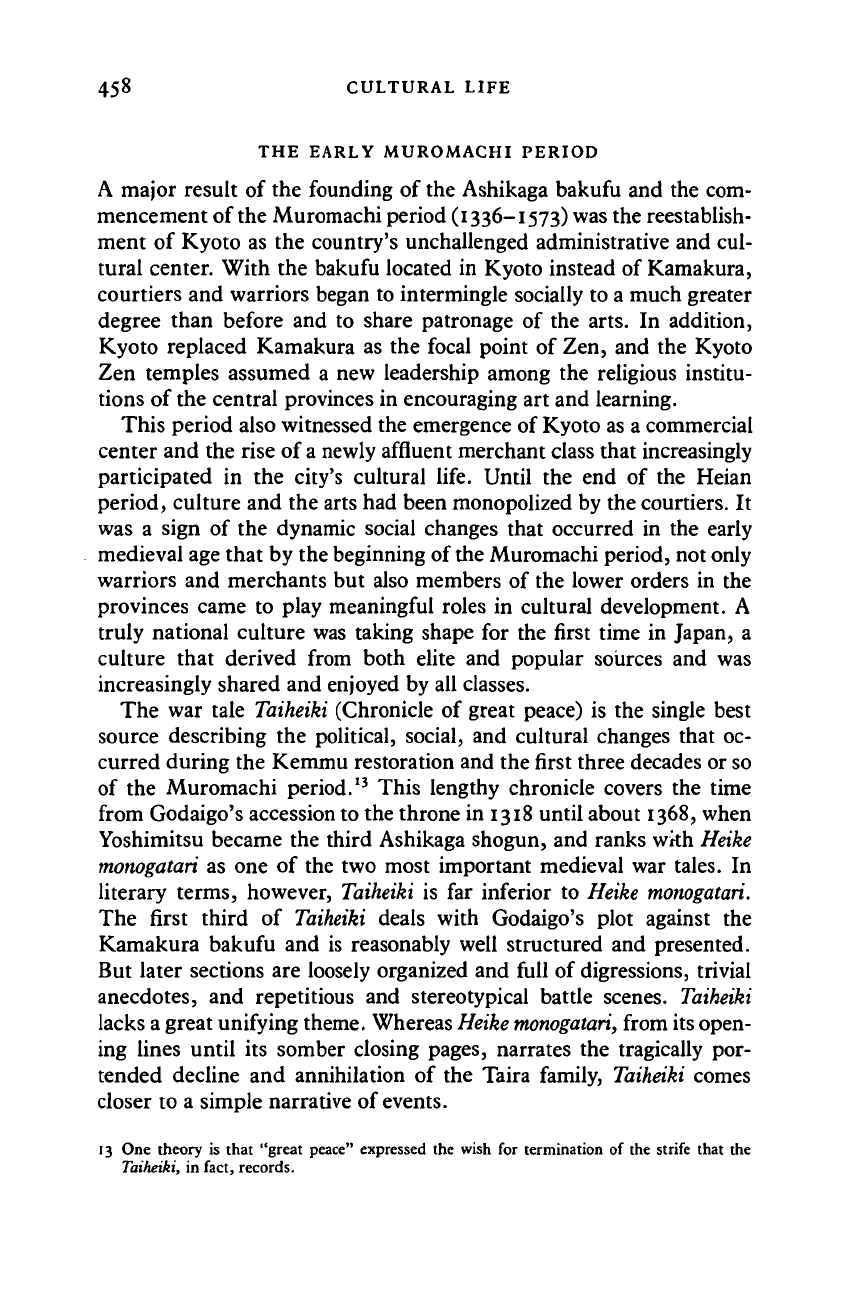
458 CULTURAL LIFE
THE EARLY MUROMACHI PERIOD
A major result
of
the founding
of
the Ashikaga bakufu
and the
com-
mencement of the Muromachi period (1336-1573) was the reestablish-
ment
of
Kyoto
as the
country's unchallenged administrative
and
cul-
tural center. With
the
bakufu located
in
Kyoto instead
of
Kamakura,
courtiers
and
warriors began
to
intermingle socially
to a
much greater
degree than before
and to
share patronage
of the
arts.
In
addition,
Kyoto replaced Kamakura
as the
focal point
of
Zen,
and the
Kyoto
Zen temples assumed
a new
leadership among
the
religious institu-
tions
of
the central provinces
in
encouraging
art
and learning.
This period also witnessed the emergence
of
Kyoto as a commercial
center and the rise
of
a
newly affluent merchant class that increasingly
participated
in the
city's cultural life. Until
the end of the
Heian
period, culture and the arts had been monopolized by the courtiers.
It
was
a
sign
of the
dynamic social changes that occurred
in the
early
medieval age that by the beginning of
the
Muromachi period, not only
warriors
and
merchants
but
also members
of
the lower orders
in the
provinces came
to
play meaningful roles
in
cultural development.
A
truly national culture was taking shape
for the
first time
in
Japan,
a
culture that derived from both elite
and
popular sources
and was
increasingly shared and enjoyed by all classes.
The
war
tale
Taiheiki
(Chronicle
of
great peace)
is the
single best
source describing
the
political, social,
and
cultural changes that
oc-
curred during the Kemmu restoration and the first three decades or so
of
the
Muromachi period.
13
This lengthy chronicle covers
the
time
from Godaigo's accession to the throne in 1318 until about 1368, when
Yoshimitsu became
the
third Ashikaga shogun,
and
ranks wkh
Heike
monogatari
as one of the two
most important medieval
war
tales.
In
literary terms, however,
Taiheiki
is far
inferior
to
Heike
monogatari.
The first third
of
Taiheiki deals with Godaigo's plot against
the
Kamakura bakufu
and is
reasonably well structured
and
presented.
But later sections
are
loosely organized
and
full
of
digressions, trivial
anecdotes,
and
repetitious
and
stereotypical battle scenes. Taiheiki
lacks a great unifying theme. Whereas
Heike
monogatari,
from its open-
ing lines until
its
somber closing pages, narrates
the
tragically
por-
tended decline
and
annihilation
of the
Taira family,
Taiheiki
comes
closer
to a
simple narrative
of
events.
13
One
theory
is
that "great peace" expressed
the
wish
for
termination
of
the strife that
the
Taiheiki,
in
fact, records.
Cambridge Histories Online © Cambridge University Press, 2008
